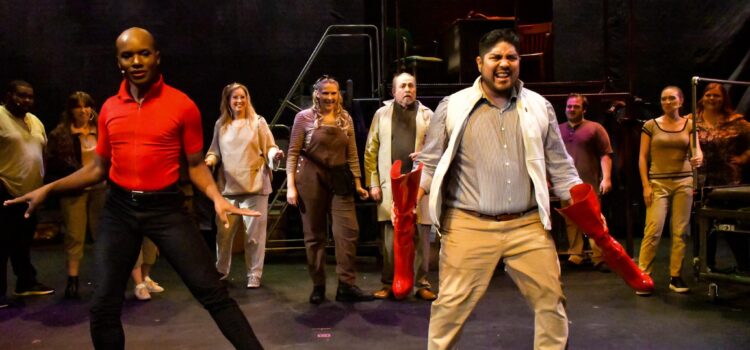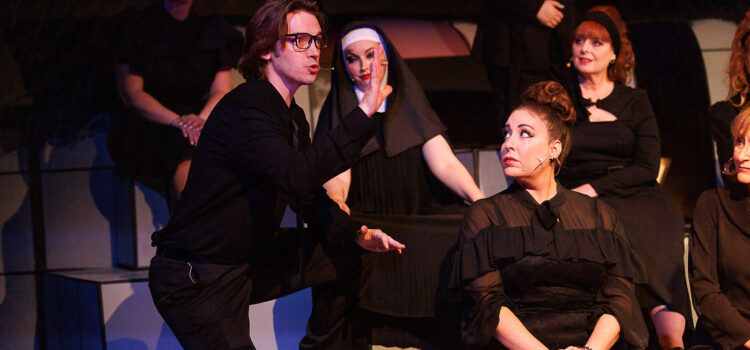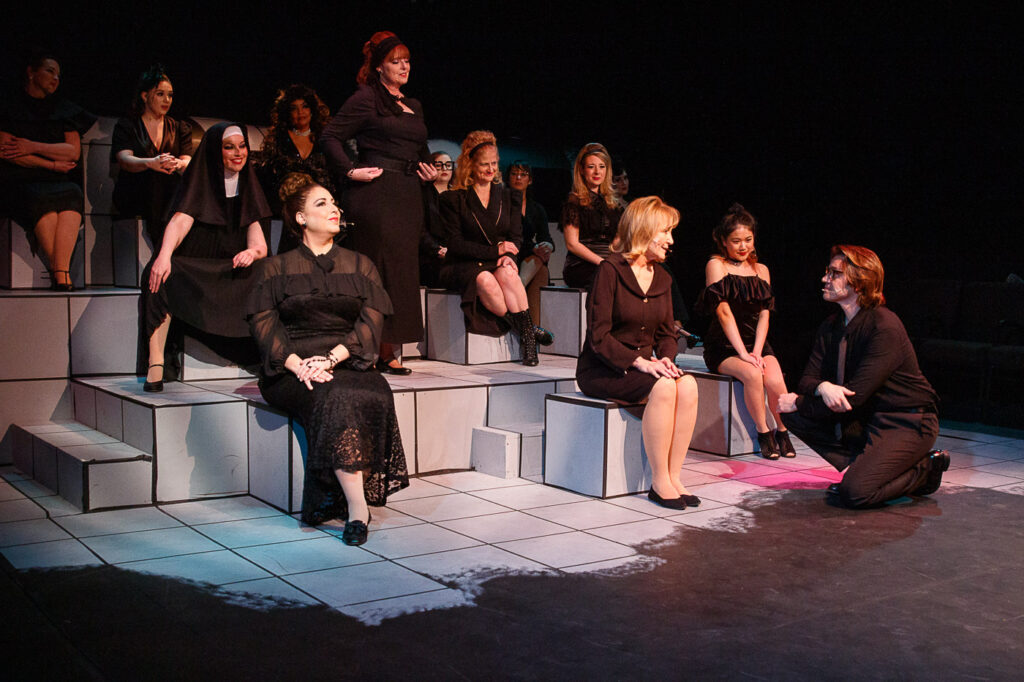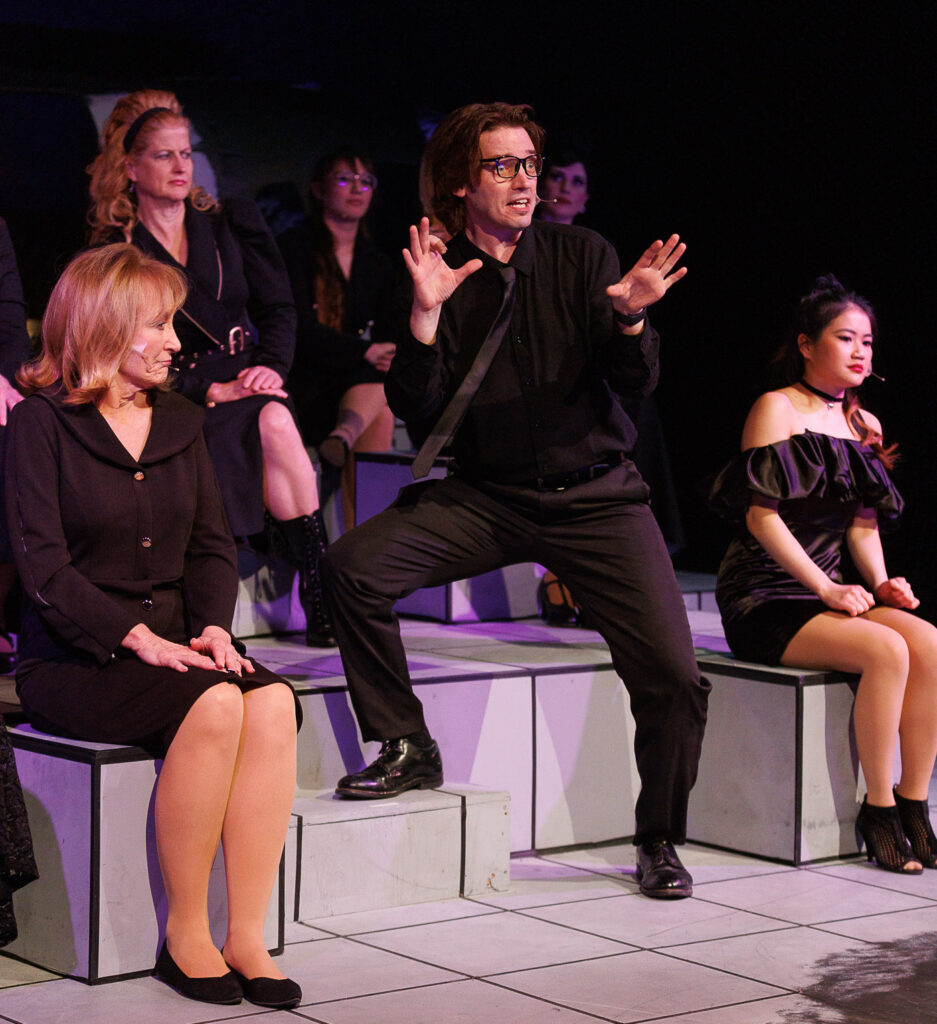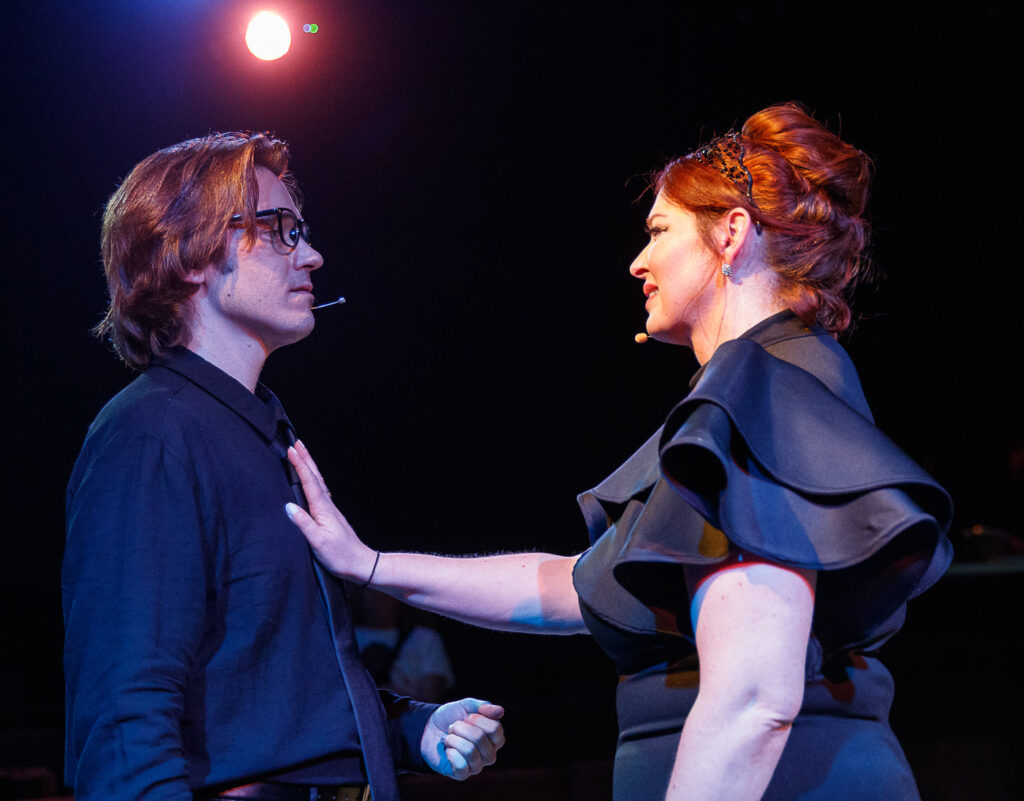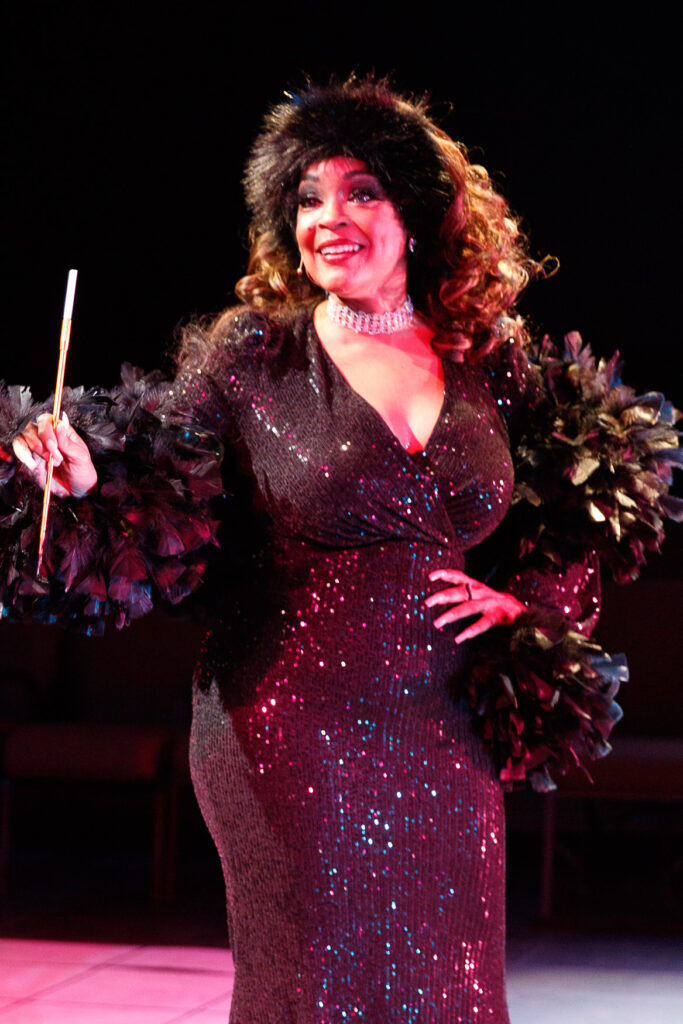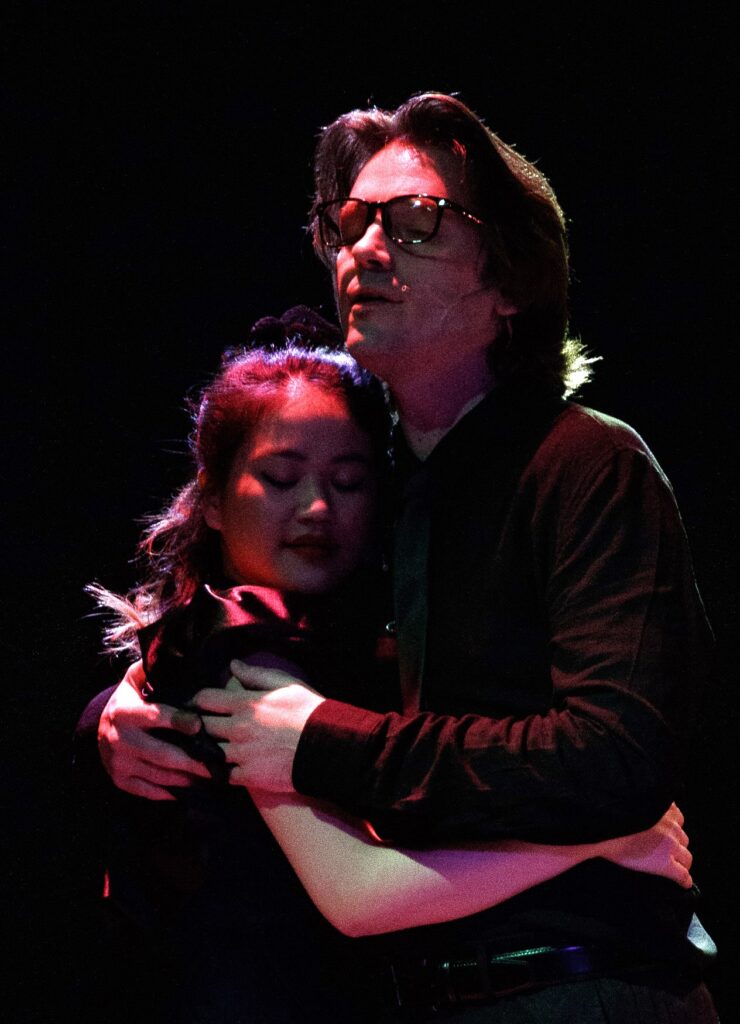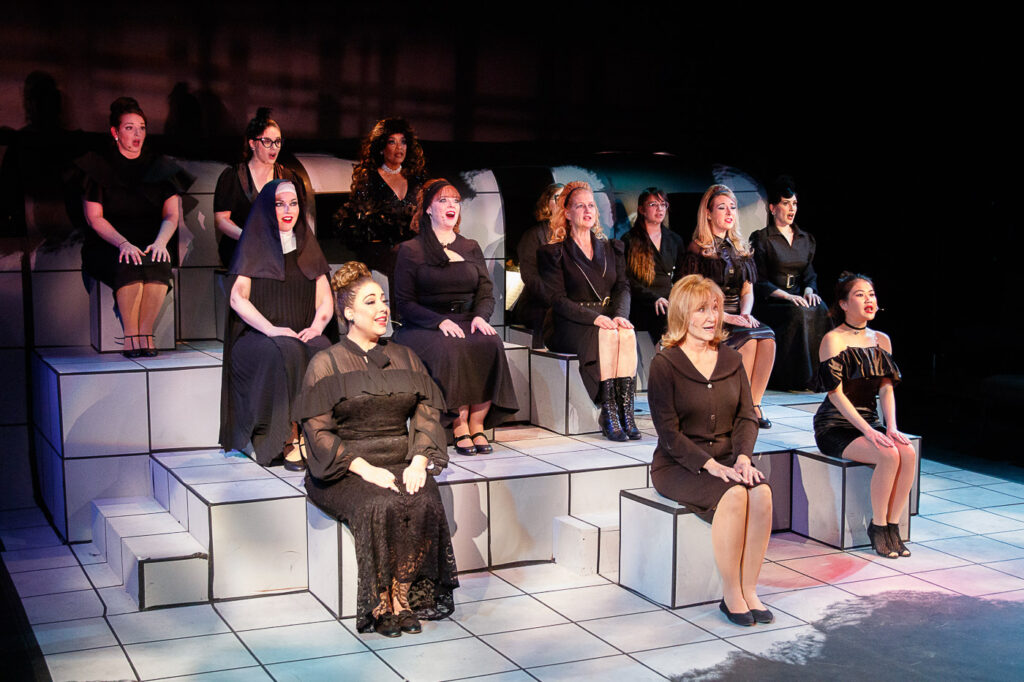By Lynn Venhaus
With its big heart and lofty ambitions, Tesseract Theatre Company has performed its first big splashy musical in St. Louis, and “Kinky Boots” is a chef’s kiss of a show, a celebration of possibilities and a tour-de-force performance by Tielere Cheatem as Simon/Lola.
Cheatem, a standout local performer and St. Louis Theater Circle Award winner, as housekeeper Jacob in New Line Theatre’s “La Cage Aux Folles” in 2019, has always had a ‘je ne sais quoi’ quality on stage, but as Lola, they are magnificent.
Cheatem makes the role that won Billy Porter a Tony Award their own and seizes that stage in authentic diva mode, with a ferocity and a passion that is remarkable to behold. It’s a fully realized, multi-layered performance.
Overcoming obstacles is the ebullient show’s theme, along with acceptance and tolerance, so it is understandable that moving to a larger space than they are used to, The Grandel Theatre, would present its own challenges. Opening night Aug. 17 was marred by sound problems, but Gruenloh said they have worked to solve those issues.
Tesseract’s previous small-scale musicals, “Ordinary Days” in November 2022 and “The Last Five Years” in February 2023, were performed at the .Zack Theatre. Tesseract’s “Kinky Boots” is also the second regional production after the Muny’s premiere in 2019.
Cheatem has a sweet chemistry with co-lead Kelvin Urday as Charlie Price, who inherited a failing shoe factory from his dad. They are a palpable pairing, and when they duet to “Not My Father’s Son,” their harmony tugs at the heartstrings.
In fact, the ballads about parental expectations and other relationships are memorable – Lola’s tearful “Hold Me in Your Heart” and Charlie’s “Soul of a Man.”
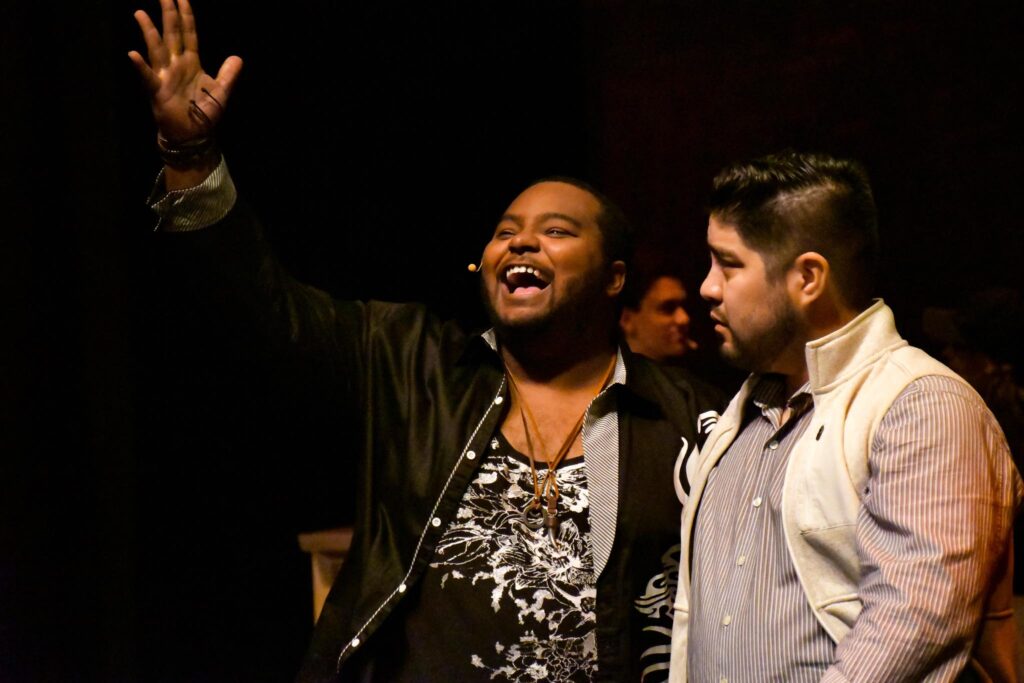
Urday displays confidence in his characterization of Charlie, who reluctantly took over the fourth-generation family business, Price & Son, which is on the verge of bankruptcy, and the weight of his father’s legacy leads him to much soul-searching. His earnest delivery of his “Step One” solo is also noteworthy.
Inspired by the life force that is the eccentric Lola, whose drag attire includes unsteady stilettos, the factory begins a niche business model, and those glittery sturdy “kinky boots” are made well to meet the needs of flamboyant performers-in-drag.
The musical “Kinky Boots” is based on a 2005 British film starring Chiwetel Ejiofor as Simon/Lola and Joel Edgerton as Charlie, which was based on a true story and a BBC documentary, and premiered at the 2006 Sundance Film Festival, catching the eye of some Broadway producers.
Thus began its journey to the stage. It premiered on Broadway in 2013, the adaptation by four-time Tony winner Harvey Fierstein and music and lyrics by first-timer Cyndi Lauper, the Grammy-winning pop icon, who won a Tony for the score, which is an infectious mix of club music and heartfelt ballads. The musical won six Tonys, including best musical, from a season-high 13 nominations.
It also won London’s Olivier Award for Best Musical and the Grammy Award for Best Musical Theatre album. It ran for six years and 1,400 performances until April 7, 2019.
The Tesseract ensemble includes some seasoned veterans, like versatile Marshall Jennings as the intimidating and homophobic foreman Don, dynamic Carrie Wenos as sassy line worker Trish, Loren Goudreau in her local debut as amiable worker Pat, who are all seamless. Kent Coffel, ‘an iron man’ in local theater this summer, is a good fit as Charlie’s proud hard-working dad and briefly seen as manager George.
Kaitlin Gant announces her presence as factory worker Lauren who fancies Charlie. Her standout number is the humorous “The History of Wrong Guys.”
Strong singer Chelsie Johnston, recently seen in “Nine” at New Line, has the thankless role as Charlie’s posh girlfriend Nicola, who is a status conscious social climber and meant to not be likable.
And there are some new-to-St. Louis performers, so to feel their joy is inspiring. They look like they are so happy to be on that stage, relatable in that ‘work family’ way, and emphasizing the message “You can change the world if you change your mind.”
Lindsey Grojean, Sarah Lueken, David Pisoni, Tori Ray, Corinna Redford, Michelle Sauer, Josie Schnelten and Aaron Tucker Jr. are a merry bunch as the factory ensemble. Tucker is stellar giving advice as Charlie’s childhood pal in a spirited “Take What You Got” and Redford is hilarious as the stage manager in Milan.
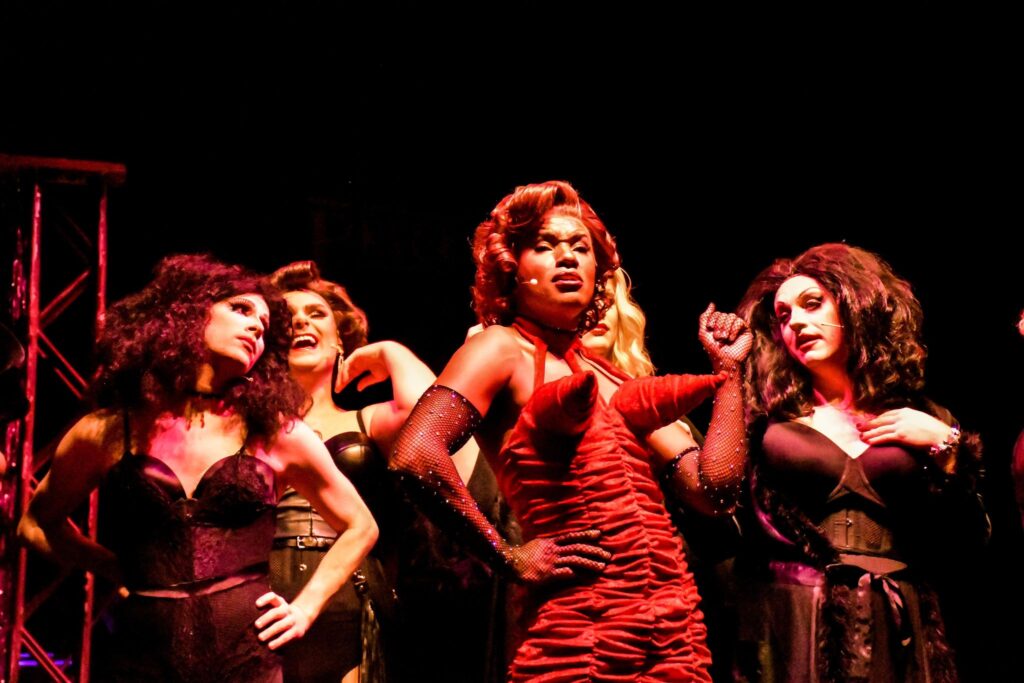
Splendid are The Angels – Lola’s six drag queen back-up singers at the seedy nightclub where they perform a cabaret act, notable with their in-your-face bravado. The always outstanding Mike Hodges and Jordan Woods, also local choreographers, as well as the ever-radiant Dylan Stanley, with their effervescent energy are matched by flashy newbies Todd Garten, Ronnie Wingbermuehle, and Nick Zobrist. They sparkle in “Land of Lola” and “Sex is in the Heel.”
Asher Woodward and Mark Ambrose Hill are impressive as the young Charlie and Lola respectively.
The cast brings the fun out in the cheery Act 1 finale “Everybody Say Yeah,” and is ecstatic in the up-on-your-feet anthem closer “Raise You Up/Just Be,” which is a marvelous way to spread hope in a universal message.
Taylor Gruenloh, who directed this musical first at the Missouri University Science & Technology in the spring, where he is an assistant professor in theatre, has honored the uplifting nature of the book, focusing on humanity – and made the humor zing. He knows how to get laughs, too, and deftly works in physical comedy.
He also ensured that the British accents were spot on – hurray!
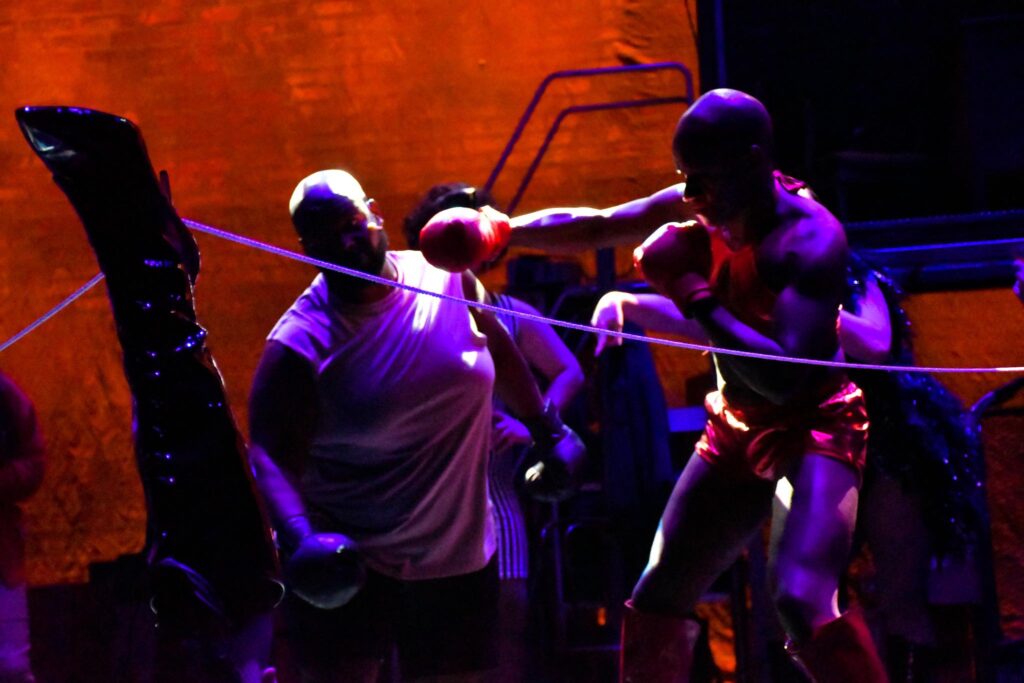
He shares the same affection for the material as celebrated music director Nicolas Valdez and experienced choreographer Maggie Nold, with Michelle Sauer the dance captain.
However, Valdez is not conducting a 12-piece orchestra but using recorded tracks from the publisher Music Theatre International that includes orchestrations and arrangements by Stephen Oremus for the performances. Charlie Heil was a music supervisor.
Zachary Phelps’ costume designs are stunning, and to learn that he’s a 19-year-old college student makes it even more astonishing. He also was the makeup assistant. The well-fitted wigs were designed by Sarah Gene Dowling and the wig supervisor was Analyse Thropic.
Technical director Kevin Salwasser and sound designer/supervisor Phillip Evans had to master the issues at the Grandel, as did lighting designer Max Demski.
Scenic designer Taylor Gruenloh created a believable and modest set, with a working conveyor belt, and was able to keep the action flowing. He also kept the focus on the performers.
On one level, it’s a feel-good dance party. Yet, Tesseract’s production is another exclamation point on the need for inclusion and individuality. And that is “The Most Beautiful Thing in the World.”
You may fall head-over-high-heels with this cast and crew, and you could be singing “Raise You Up” at the jubilant curtain call, which should empower everyone to “Feed your fire,” and perhaps like me, leave dancing in the aisles.
Tesseract Theatre Company presents “Kinky Boots” Thursday through Saturday, Aug. 17-27, at 7:30 p.m., with Sunday matinees at 2 p.m., at the Grandel Theatre, 3610 Grandel Square, St. Louis. Tickets are available at MetroTix.com. Questions can be sent to Tesseract Theatre at contact@tesseracttheatre.com
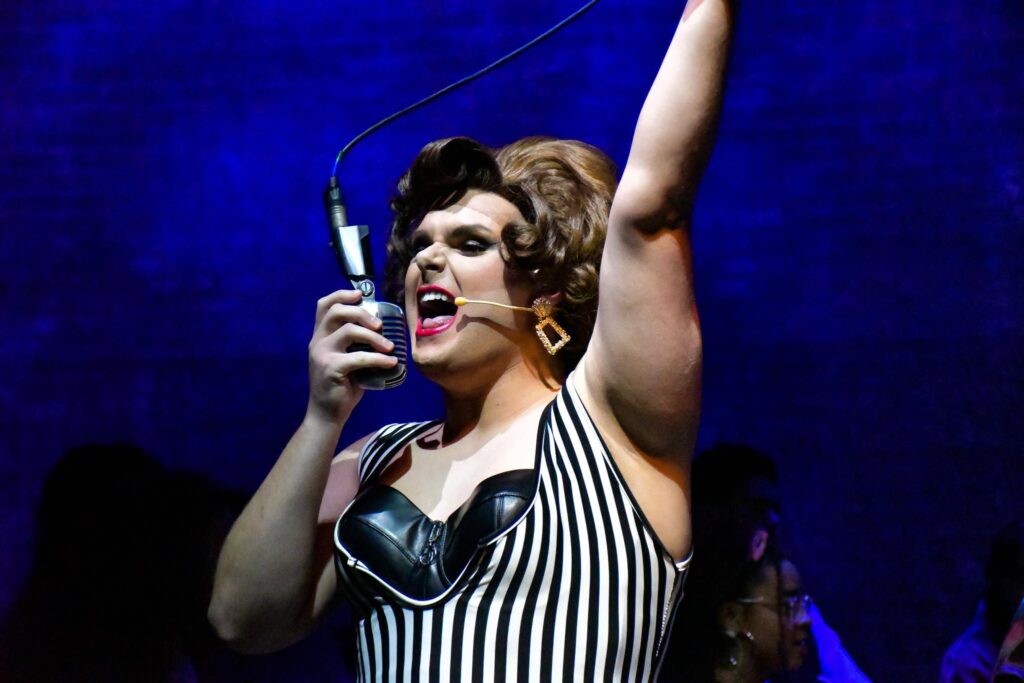

Lynn (Zipfel) Venhaus has had a continuous byline in St. Louis metro region publications since 1978. She writes features and news for Belleville News-Democrat and contributes to St. Louis magazine and other publications.
She is a Rotten Tomatoes-approved film critic, currently reviews films for Webster-Kirkwood Times and KTRS Radio, covers entertainment for PopLifeSTL.com and co-hosts podcast PopLifeSTL.com…Presents.
She is a member of Critics Choice Association, where she serves on the women’s and marketing committees; Alliance of Women Film Journalists; and on the board of the St. Louis Film Critics Association. She is a founding and board member of the St. Louis Theater Circle.
She is retired from teaching journalism/media as an adjunct college instructor.

